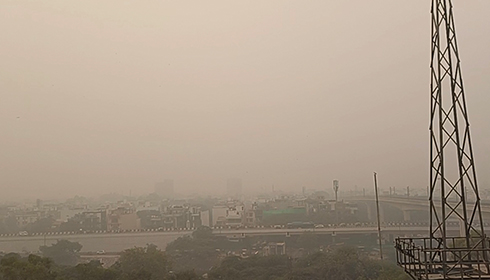
Air pollution is a ticking volcano
The hazy sky, watery eyes, closed schools, children coughing in the street, complaints of shortness from elderly people, and an increase in hospital admissions for respiratory disorders because of the dangerous air quality have all become the new normal in Delhi-NCR in the months of October and November of each year.
However, this isn't the new normal in practice. It will eventually lead to a number of serious illnesses that most people are unaware of. Dr. Arunesh Kumar, Senior Consultant and Head of Respiratory Medicine, Paras Health, Gurugram, stated in an interview with Drug Today Medical Times that the current state of air pollution in the Delhi-NCR is actually a ticking volcano that will eventually blow.
He emphasized that the current state of air pollution, which appears to be limited to two or three months, actually spans the entire year.
"After two or three months, the air quality stays extremely poor throughout the year, which has a long-lasting effect on our health," Dr. Kumar continued. In the future, there will be an explosion of people with a wide range of non-communicable illnesses, including cancer, heart attacks, strokes, and kidney disease. The declining quality of the air is the only cause of many illnesses.
Air pollution can lead to both immediate and long-term consequences. Watering eyes, congestion in the nose, running nose, and coughing are signs of an acute allergy. According to Dr. Kumar, "continuous exposure to air pollution can cause tracheal swelling, which can further trigger allergic asthma, allergic bronchitis, and allergic rhinitis."
"Earlier we used to assume that asthma only affects children but now we are seeing it adults which, has direct link to air pollution," he said in reference to long-term complications of air pollution.
"Air pollution has been linked to an increase in lung cancer incidence in certain cases. Although it hasn't been proven, there is a connection between lung cancer and some aspects of air pollution, Dr. Kumar continued.
He emphasized that, according to reports, air pollution in Delhi-NCR can shorten a person's life by ten years, even if they breathe above a moderate level of air quality index annually. It's really concerning.
The elderly and young are most at risk from air pollution. The most susceptible group is also those who have any chronic illnesses, including chronic lung, kidney, or heart conditions, according to Dr. Kumar.
He added that because air pollution aggravates chronic lung diseases, patients with these conditions are now presenting to our OPD with worsening symptoms.
Asthma, strokes, heart attacks, and even dementia cases have all increased in frequency.
Thus, it is progressively turning It is slowly changing into a volcano that will blow up. However, it is currently disregarded because dust and tissues can shield it. We should accept it this way because we live in a room where your indoor settings are secure, he continued.
According to Dr. Kumar, particulate matter of 2.5 is typically the most dangerous because it is smaller than hair and can alter our internal health. These particulates settle in the lungs after inhalation, causing swelling and coughing, which can lead to asthma and bronchitis. When they enter the bloodstream, they can also damage other organs.
"Because it is in blood circulation, it can cause dementia if it enters the kidneys, heart, or brain. It can also cause heart attacks and strokes if it enters the heart."Accordingly, living in an area with persistently low air quality theoretically increases your risk of dementia, heart attacks, and strokes several times over, according to Dr. Kumar.
According to Dr. Manav Manchanda, Director and Chief of Respiratory, Critical Care, and Sleep Medicine at Asian Hospital in Faridabad, "Air pollution poses an immediate risk, particularly to patients with pre-existing respiratory conditions like asthma and COPD." This patient group may experience upper respiratory infections and chest infections right away.
In a similar vein, he said, some people can get pneumonia and other issues related to the chest. Lung cancer is a long-term consequence of air pollution. Recent research has connected brain and breast cancer to air pollution.
Everyone should practice good hygiene and wear masks as standard precautions against the severe effects of air pollution.
We can use COVID19 as an example. By wearing face masks, people avoided developing further respiratory issues. Patients with respiratory illnesses and concomitant conditions shouldn't miss doses of their prescriptions. In addition, adult patients with kidney and liver diseases can receive flu shots, according to Dr. Manchanda.